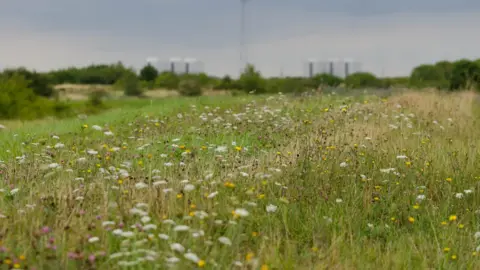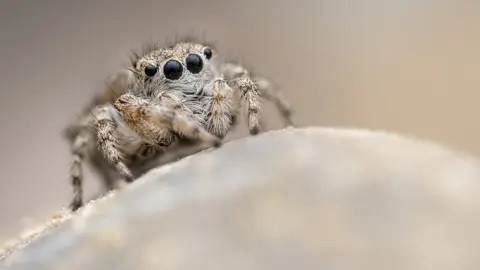London Resort: Wildlife charities unite against theme park
 Daniel Greenwood
Daniel GreenwoodThree conservation charities have come together to object against plans for a theme park on a "nationally important" wildlife site in Kent.
The London Resort is currently going through the planning application process and, if approved, work could start on Swanscombe's marshes in 2022.
Kent Wildlife Trust, Buglife and the RSPB want it to be declared a Site of Special Scientific Interest (SSSI).
Andy Martin, from London Resort, said it planned to "enhance" the habitat.
If approved, the mainly brownfield site would be transformed into the first major theme park to be built in Europe in nearly 30 years.
The 535-acre site would have two theme parks, a water park, hotels, shopping centres and entertainment venues, and is ultimately expected to support 17,000 jobs.
The wildlife groups, however, are calling on Natural England to step in. If the conservation body declares the area a SSSI, it would be given more protection.
 The London Resort
The London ResortA spokesperson for the wildlife groups said recent surveys revealed the Swanscombe Peninsula was home to 250 rare and threatened species - thought to be more than any other brownfield site in the UK.
That includes bees, beetles, bats, nightingales, reptiles, water voles and the critically endangered distinguished jumping spider - a species found in only one other site in the country.
A public consultation last year broadly backed the £3.5bn project, with the majority of respondents supportive of the resort's approach to the environment and biodiversity.
Mr Martin, a director of the London Resort, said much of the peninsula would remain undeveloped, and some designated wildlife zones would be closed off to the public to protect the habitat.
 Roman Willi
Roman WilliHowever, the wildlife groups said the plans still left the "rich diversity" of life "under-threat".
The groups said the site - once a gas works and landfill - was home to a "unique mosaic of coastal habitats, grasslands, scrub and wetlands that have developed as a result of the site's complex human history".
This is coupled with the Thames Estuary's "unique climate, which is more continental than the rest of the UK," and provides a home to species more commonly found in the Mediterranean, which are "at the northerly limits of their range and unable to survive elsewhere in the UK," the group said.
A letter urging Natural England's chief executive Marian Spain "not to condone any development that would damage any part of the site" was signed by 77 people, including the heads of 24 conservation organisations, alongside more than 30 former officers from the public body and its predecessors English Nature and the Nature Conservancy Council.
 London Resort
London ResortMr Martin said the London Resort was "committed to delivering a net gain in biodiversity".
"The area has been largely left, unmanaged for decades," he said. "According to experts, if it continues to be unmanaged, it will eventually turn to scrub and the precious habitats will be lost."
Natural England said it was "aware of the wildlife importance" of the site and is considering whether it should become a SSSI, with a decision expected in early 2021.
